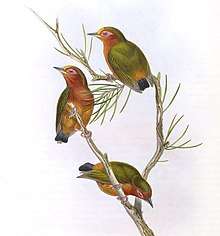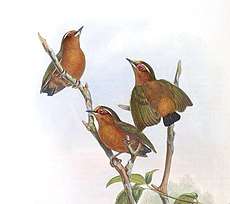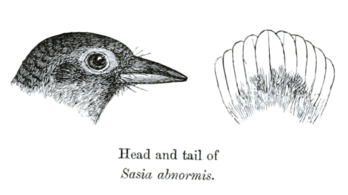Sasia
Sasia is a genus of birds in the family Picidae, that are native to the Old World. They are very small, virtually tailless woodpeckers, with a crombec or nuthatch-like appearance and foraging habits. Their habitat is forest and secondary growth.[1]
| Sasia | |
|---|---|
 | |
| Sasia abnormis by Gould & Richter | |
| Scientific classification | |
| Kingdom: | Animalia |
| Phylum: | Chordata |
| Class: | Aves |
| Order: | Piciformes |
| Family: | Picidae |
| Subfamily: | Picumninae |
| Genus: | Sasia Hodgson, 1837 |
| Species | |
|
3, see text | |
_distr04.svg.png) | |
| range of genus | |
All three species have a flesh orbital ring and a rounded (in cross-section) upper mandible.[2] The African species has only eight rectrices but four toes in a zygodactyl arrangement (a weak first digit), while the two Asian species have ten rectrices and only three toes (absent first digit, or hallux).[2] In addition the African species differs from the Asian species in plumage colour of the adult, but not at all in plumage pattern, body anatomy or in habits.[3]
Their relationship with genus Picumnus has not been established, and the Picumninae may be either monophyletic[4] or paraphyletic.[5]
Species
It contains the following species:
- African piculet (Sasia africana) – moist African tropics
- Rufous piculet (Sasia abnormis) – mainly Malaysia and Indonesia
- White-browed piculet (Sasia ochracea) – mainland Southeast Asia
Gallery

Sasia ochracea
by Gould & Richter
Close-up of the head
and tail of S. abnormis
References
| Wikimedia Commons has media related to Sasia. |
- Stevenson, Terry; Fanshawe, John (2001). Field guide to the birds of East Africa: Kenya, Tanzania, Uganda, Rwanda, Burundi. London: T. & A.D. Poyser. pp. 280–281. ISBN 9780856610790.
- Gorman, Gerard (2014). Woodpeckers of the World: The Complete Guide (Helm Photographic Guides). London: Bloomsbury. p. 88. ISBN 1408147157.
- Delacour, J. (January 1951). "The significance of the number of toes in some woodpeckers and kingfishers" (PDF). The Auk (American Ornithological Society). 68 (1): 49–51. doi:10.2307/4080797. Retrieved 20 September 2018.
- Benz et al., 2006; Dufort, 2015; Webb and Moore, 2005
- Winkler et al., 2014